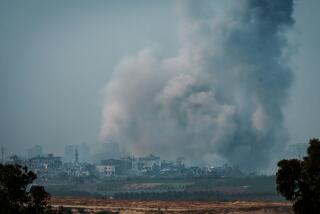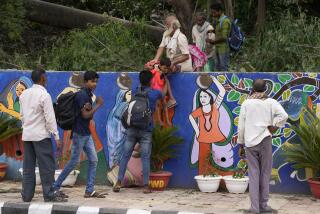Mumbai Gets Back to Work
- Share via
MUMBAI, India — Ward 1 of Hinduja Hospital treats male patients with psychiatric and skin disorders, but not the kind seen here Wednesday.
There was the man suffering such mental anguish that he emitted terrified, bone-chilling screams every few minutes. Propped up in beds around him were other dazed-looking patients with fragments of metal embedded in their skin -- along their backs, in their arms and legs.
This was the aftermath of the worst terrorist attack in India in more than a decade, a series of synchronized explosions on a crowded commuter railway that killed as many as 200 people and wounded hundreds here in the country’s financial and entertainment capital.
On Wednesday, the day after, the people of this western port city struggled to return to business as usual, evincing both anxiety and aplomb in the face of massive tragedy.
“Life must go on,” 32-year-old commuter Sachin Kotian said as he resolutely prepared to board a train at the Matunga station, one of the worst-hit sites.
Eight explosions in less than 20 minutes ripped through trains and platforms on a key rail line in western Mumbai, formerly known as Bombay, at the height of Tuesday’s evening rush hour. Officials blamed the attack on terrorists, though no one had taken responsibility.
Authorities Wednesday sifted through the wreckage for clues as to who carried out the attack and exactly how. A police official, who asked not to be identified because he was not authorized to speak to the media, said the blasts were caused by timer-equipped devices, not by suicide bombers.
The death toll continued to climb -- to 200, one state official said -- and hospitals staggered under the load of treating hundreds of injured.
Frantic relatives still struggled to learn the fate of loved ones. And there was concern that anger could ignite sectarian violence in a city where Hindus and Muslims have engaged in deadly clashes.
But the overall impression Wednesday was of a community trying hard to pull together and soldier on.
Mumbaikars are conscious of their city’s image as resilient, exciting and self-assured, the shining success story in India’s steady economic rise, and few seemed willing to surrender that reputation. Even the Bombay Stock Exchange defied expectations and closed up 3%.
“Mumbai is the heart of India,” said Neha Mehta, 24, “and Mumbai people are very practical.”
That practicality drove commuters, albeit in fewer numbers than usual, back onto the rail line, which reopened in the morning under tightened security. Mumbai’s rail network serves 6 million passengers a day. For many residents, the system is the most efficient way to navigate the city, especially into the heart of the southern financial sector, where many big-name companies are based. Buses are too slow and taxis too expensive.
“There aren’t a lot of options,” said Douglas Morris, a software engineer and native Mumbaikar who rides the line daily. “The trains are the lifeline of the city, and if the trains aren’t there, the city’s not there.”
Small adjustments in behavior, however, showed that complete normality was not possible for everyone. Teenager Bhumika Baua said she constantly looked out the train window for signs of anything amiss. Clerk Shashikand Gawaski, 46, checked beneath his seat and on the overhead luggage racks for suspicious packages before sitting down.
“Now there will be fear in every passenger’s mind that there will be a bomb blast again,” Gawaski said.
Investigators are increasingly pointing a finger at Lashkar-e-Taiba, or Army of the Pure, an Islamic militant group the Indian government blames for the October serial bombings in New Delhi, which killed more than 50 people.
Officials say the group, which opposes Indian rule in the divided Kashmir region, may have had help locally from a radical Islamic student movement.
“It is difficult to say definitely at this stage, but Lashkar-e-Taiba [could] be involved, going by the style of attack,” P.S. Pasricha, director-general of police for Maharashtra state, told reporters.
“We had an idea since some months that Bombay was a target,” he said. “Since it is the financial capital, there are many vulnerable areas in the city.”
The Associated Press reported that Pakistan-based Lashkar-e-Taiba had denied any role in the bombings.
But such denials from the group are routine and usually dismissed by police. On the other hand, Indian authorities often blame the organization for attacks without citing clear-cut evidence.
Suspicion that Kashmiri militants might have been involved sparked a testy exchange between India and Pakistan, which also claims the Himalayan territory as its own.
While not accusing Islamabad of directly having a hand in the bombings, New Delhi demanded that its archrival “dismantle the infrastructure of terrorism in the territory under its control.”
Pakistan called the allegation that it harbors terrorists baseless.
In Mumbai, official fears that the attack could fan religious hostilities between the city’s Hindu majority and Muslim minority did not materialize. Bitter memories remain of riots that broke out here 13 years ago after a bombing campaign linked to organized crime killed more than 250 people.
Less than a mile from the Mahim Junction station, where debris from one of Tuesday’s explosions still littered the platform, Iqbal Hussain runs a bakery in a predominantly Muslim neighborhood.
Last weekend, hard-line Hindu nationalists came marching down his street ordering Muslim shops to close, but a show of force by the merchants of the neighborhood chased off the interlopers.
Yet Hussain, 60, doesn’t think sectarian riots will erupt even if Islamic militants are found to have carried out the bombings. Muslims and Hindus alike say Mumbai has changed in recent years, its residents now more interested in getting ahead and getting rich than picking fights with neighbors of different faiths at the goading, frequently, of certain political figures.
“Except for the politicians, all others live together harmoniously,” Hussain said.
Some also died together Tuesday.
“Muslim people were also killed in the blasts. [The attackers] weren’t just targeting Hindus,” said Kotian, the commuter. “They were targeting all people.”
Television footage showed grief-stricken families cremating their dead. An old woman waved a photo of a loved one whom she could not find, hoping someone would recognize him. In a grimy hospital bed lay a young boy, unclaimed.
Forty-one of the dead were brought to Hinduja Hospital. An additional 34 people remained under treatment there Wednesday, including Sunil Karnik, a bank worker whose relatives sat anxiously outside Ward 1 after trying to get him to talk about what had happened.
“He was scared. He was emotional. He only said that he heard a blast and that something hit him in the ear and he jumped out” of the railway car, said Karnik’s niece Anupa Rane.
But she predicted that her uncle would join other Mumbaikars back on the train as soon as he was able.
“He’s not afraid,” Rane said.
More to Read
Sign up for Essential California
The most important California stories and recommendations in your inbox every morning.
You may occasionally receive promotional content from the Los Angeles Times.














